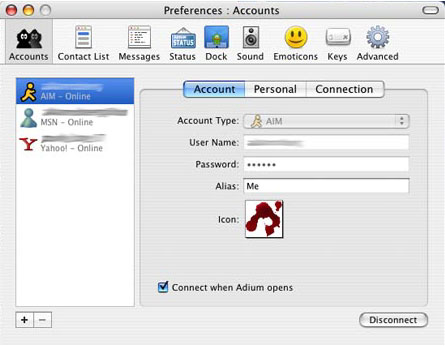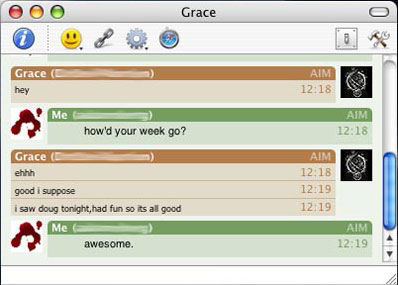Certain applications you can keep installed on your machine,
using them trouble-free for years. However, applications that
depend on the Internet are not like that. As people who've tried to
get, say, a Macintosh SE on the
Internet will tell you, it's basically useless on the Internet
because the Internet has forced even the newest applications the SE
can run into obsolescence.
The Internet has now done the same for the latest Mac version of
AOL Instant Messenger. Sure, it can still be used - but the
features it has are nowhere close to being on par with IM clients
from other companies. On the PC, I use Trillian from
Cerulean Studios. It offers more features than the AOL IM client
(such as support for skins, conversation logging/previous
conversation display, tabbed windows/containers, etc.) and also
offers support for MSN and Yahoo, which means that I don't need to
have three applications open at once - an added plus.
When I put OS X on my G3, I wanted an IM client up to the
standards of Trillian. Unfortunately, Cerulean doesn't offer a Mac
version of its product, but where there's a market for a product,
some company usually ends up stepping in to offer it.
In this case, that product's free.
Adium is available
free of charge; supports AIM, MSN, Yahoo, ICQ, and more; and it
blends in nicely with Mac OS X.
I tried out Adium when it first came out and wasn't terribly
impressed. It seemed to be lacking a lot of features and had a
relatively simple interface. That's nothing like what Adium has
become, and if you haven't tried it recently, you're missing
out.
So, why's it so great?

The preference panel is organized very similarly to the Mac
OS X System Preference panel, which makes it easy to find your
way around.
Adium allows for more than just one account (unlike AOL's AIM
for Mac, with which you can only be signed on to one account at a
time), and with Adium, as with Trillian, you can be signed onto
AOL, MSN, and Yahoo at the same time.
Adium allows for aliases (similar to iChat in that respect) and
now supports profiles in AIM (under 'Personal').
You can also select the "style" of the message windows that you
prefer, and Adium gives you six basic types with about 20 different
sub-layouts of those types. You can set your font, colors, size,
whether or not to log IM's, and if you want to use tabbed windows.
You have control over whether the dock icon bounces annoyingly on
incoming messages, and you can choose the style of emoticons (I
quite like the default ones) - or you can disable them
completely.
Adium also gives you a host of advanced options, such as how
Adium behaves with your address book (built in to Mac OS X),
how it treats aliases, displays old messages, and much more.
Basically, Adium gives you more options than you could possibly
think to use. And it doesn't forego stability for features.
I've only found two downsides so far. Firstly, when receiving
files, it doesn't tell you what percentage of the file has been
received (all other IM clients that I've used do), so you need to
rely on the other person to tell you when the file's done.
Secondly - and probably partly because of all of the features it
offers - Adium does seem to be a bit slow, especially on older
computers like my 350 MHz G3. I
installed it on my 867 MHz 12"
PowerBook, and it seemed tolerable, but it's still not speedy.
I suppose if you have a G5 it wouldn't feel slow at all.

chat window using Mockie style
Fortunately, Adium gives you the choice to disable a lot of
different settings (such as it highlighting people's usernames
while they're typing) that are enabled by default, and you can
always select a simpler message display style (I use Mockie for my
message windows, and "standard (small)" for my contact list).
If you need a good, reliable client that supports more than just
one IM service, give Adium a try.




